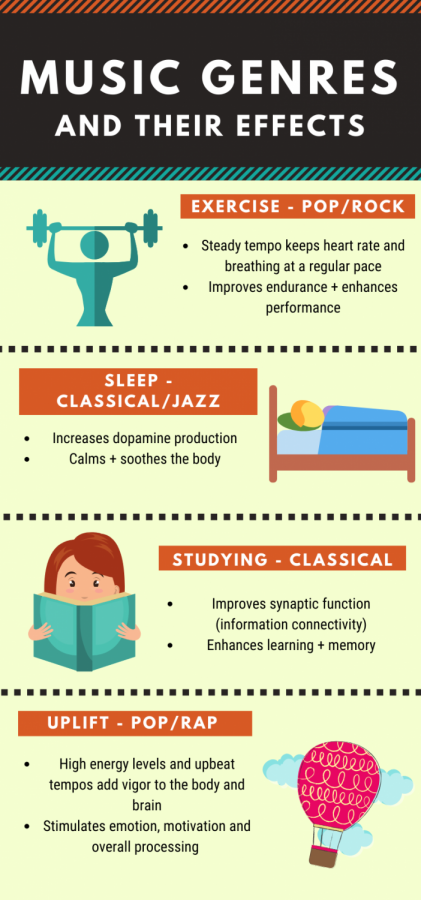Music on the Mind: How your favorite songs affect you
November 25, 2019
While walking the halls, sitting in classrooms and even speaking to others, a number of Chantilly students bob their heads to an unknown beat. Closing their eyes, seemingly ignorant of the time, setting and location, their surroundings crumble and all thoughts are immersed in the melodious beat and its lyrics. Music plays an integral role in social affairs, and many of us incessantly listen to music in various aspects of life: doing homework, at parties, exercising or while relaxing at home.
“I’ve lately been listening [to music] for the production aspect in my life, since it’s something I want to do in the future,” senior and singer-songwriter Joanne Moon said. “I always blast music that fits my mood, whether it’s positive or negative.”
Often used as an outlet for different emotions, music has the ability to affect one’s mood and self-esteem; while upbeat songs tend to elicit energy and enjoyment, sad songs evoke more solemn responses. A study in 2016 performed by Time magazine noted that listening to upbeat music could boost the mood and well-being of the participants while reducing stress levels. Many people overlook the therapeutic effects of music on the physical body as well. For example, in a 2015 report, The Lancet found that people who listened to music prior to, during or after a medical procedure experienced less pain and stress.
Although music provides a steady source of gratification, dependency on listening to it has become increasingly evident in our society. Nowadays, it is rare to find students working in solitude without the thoughts of another artist ringing in their ears.
“I don’t think that it’s a modern phenomena that we’re too focused on music,” English teacher Kimberly Scott said. “What I do think is that our almost addiction to technology has caused us to individualize, rather than corporately enjoy music as much as we used to.”
If not for simple enjoyment, many often put on headphones in concentration, attempting to isolate themselves from their peers. With headphones in, blasting music, we are deemed less approachable and more closed off from society. Does this give us the solitude we need from time to time, or does this lead to an uncollaborative society?
With the number of new releases— particularly in the rap genre— promoting drug usage, violence, gangs, profanity and premature sexual behavior, students now more than ever need to be aware of the messages within the lyrics.
“Our emotions control our actions, so if one were to listen to a song that promotes violence, especially during a time when they are vulnerable, it is more likely to cause him or her to do harm as well,” junior Stephanie Fang said. “I think people listen to songs like this because they aren’t aware of the meaning or care. Usually people just like the beat, but they don’t fully understand the context or what the lyrics are implying. Lyrics nowadays don’t explicitly state what the song is about, so many people are just ignorant.”
However, many students find solace in these types of songs, regardless of the ideas projected. So the question arises: should we avoid music promoting unethical behavior?
“If that kind of music makes people happy, I guess they could listen to it,” Tri-Music Honor Society vice president and senior Madeleine LeBeau said. “But I don’t think they should be learning their life morals from music that does not promote the correct things.”
If teenagers do surround themselves with this type of music, then they must be aware of the subconscious effects music can have on their daily lives. After all, messages affect society.
“Music lyrics are words; words make up messages, and messages affect thinking,” Scott said. “The words you listen to direct the way you fly.”


